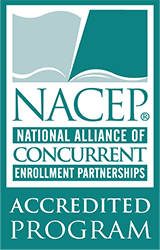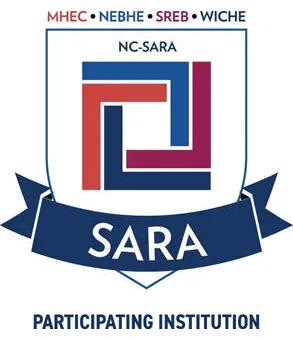Program Accreditations
The Automotive & Diesel Service Program has received the Master Automobile Service Technology Accreditation from the National Institute for Automotive Service Excellence.
 In 2017, Mid received accreditation from the National Alliance of Concurrent Enrollment Partnerships (NACEP) for the courses the College offers at local high schools. NACEP works to ensure that college courses taught by high school teachers are as rigorous as courses offered on the sponsoring college campus. This accreditation ensures that Mid classes adhere to the highest standards so students experience a seamless transition to college.
In 2017, Mid received accreditation from the National Alliance of Concurrent Enrollment Partnerships (NACEP) for the courses the College offers at local high schools. NACEP works to ensure that college courses taught by high school teachers are as rigorous as courses offered on the sponsoring college campus. This accreditation ensures that Mid classes adhere to the highest standards so students experience a seamless transition to college.
Mid is the first public institution in Michigan to receive this recognition for excellence. Mid course offerings include disciplines such as Political Science, Math, and Biology. Courses are offered at local area high schools including Beaverton, Farwell, and Shepherd among others.
Learn more about Off-Campus Courses, Instructional Methods, and Accreditation.
The Training Credential: Medical Assistant program is accredited through CAAHEP - Committee on Accreditation of Allied Health Education Programs, 9355 - 113th St. N, #7709 Seminole, FL 33775, www.caahep.org/, (727) 210-2350; and the Medical Assistant Education Review Board (MAERB) 2339 N. California Ave. Chicago, IL 60647, www.maerb.org, 1-800-228-2262.
Accreditation for this program was obtained on April 30, 1999, and has been granted reaccreditation until 2024.
CAAHEP-accredited medical assisting programs have the responsibility of accurately informing their communities of interests of their accreditation status. Accreditation is a publicly held status and, as such, CAAHEP-accredited programs must provide the communities of interest accurate and easy access to the accreditation status.
The EPiC Consortium Neurodiagnostic Technology (EEG) program is accredited by the Commission on Accreditation of Allied Health Education Programs (www.caahep.org) upon the recommendation of the Committee on Accreditation for Education in Neurodiagnostic Technology. As a member of the EPiC Consortium, the Mid Michigan College Neurodiagnostic Technology (EEG) program is CAAHEP accredited.
Effective April 30, 2019 | Updated November 4, 2019
The Mid Michigan College, Associate Degree in Nursing Program, is pursuing accreditation from the National League for Nursing Commission for Nursing Education Accreditation (NLN CNEA), located at 2600 Virginia Avenue, NW, 8th Floor, Washington, DC 20037; phone 202-909-2487. Interested parties are invited to submit third party comments in writing directly to NLN CNEA (cneaaccreditation@nln.org) no later than September 15, 2025.

Mid is approved to offer distance education through NC-SARA.
The Physical Therapist Assistant Program at Mid Michigan College is accredited by the Commission on Accreditation in Physical Therapy Education (CAPTE), 3030 Potomac Avenue, Suite 100, Alexandria, Virginia 22305 - 3085; telephone: 703-706-3245; email: accreditation@apta.org; website: http://www.capteonline.org. If needing to contact the program/institution directly, please call (989) 317-4609 or email pta@midmich.edu.
The Mid Michigan College Radiography Program is accredited by the Joint Review Committee on Education in Radiologic Technology 20 North Wacker Drive, Suite 2850 Chicago, IL 60606-3182 312-704-5300 Email: mail@jrcert.org. The program’s current award is 8 years. Review the 2023 Accreditation Award Letter. General program accreditation information and the current accreditation award letter can be found on the JCERT website.